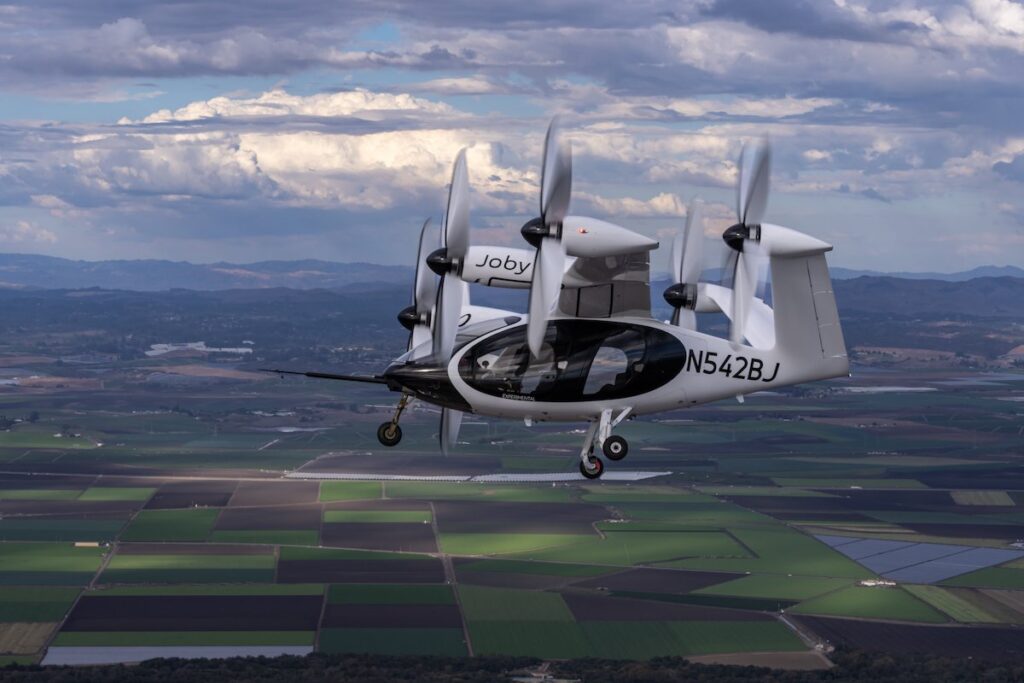2024: “The Year Flying Taxis Take Off?”
Crystal ball gazing is great fun, but rarely dependable. While it is usually hit and miss, on occasions a growing weight of evidence offers more reliability than a simple stab in the dark. So, what of the Flying Taxi industry? How will it fair in 2024?
BUMPS IN THE ROAD
Robin Riedel, a respected senior analyst at the McKinsey Centre for Future Mobility, suggests turbulence may lie ahead for the AAM industry. During an interview with wearefinn.com, he says, “The advanced air mobility (AAM) sector proved remarkably resilient in 2023 with sustained levels of funding and many timelines for testing being met, but there may yet be some bumps in the road during 2024.”
Riedel admits he is a naysayer and sceptical about the future claims being made by the industry, yet is surprised by the advancing trajectory of the market and what it has already delivered.
He says, “Everybody’s flying, everybody’s pouring concrete into facilities and so it was another year on trajectory and the reason I think that’s worth noticing is because a lot of people suggested that 2023 would be the year where reality comes down on this industry and all of a sudden we see a bunch of players fail and run out of money, we would see regulators putting a stop to all of it, and none of that happened.”

Robin Riedel
Riedel points out recent eVTOL achievements including Joby performing the first ever flying taxi exhibition flight in New York City; Volocopter conducting a multi-day flight test campaign with a crewed aircraft in the Japanese cities of Osaka and Amagasaki; and Lilium starting production of its jet.
“2023 was a good year for this industry,” he continues. “We’ve seen a lot of progress on flying, a lot of progress in the supply chain, a lot of progress in regulatory and even in public acceptance.”
Yet, with the AAM market becoming increasingly crowded analysts, including Riedel, fear the industry may be reaching a crunch point in 2024, with consolidation or some players even exiting the market entirely.
He remarks, “There are a couple of indicators where you wonder, are we hitting a little bit of a speed bump? You can look at things like Rolls Royce divesting of its electric powertrain business. And if you look at, for example, the hydrogen developers, the funding that they’ve announced was significantly smaller than what people had originally projected.”
Riedel concludes, “I think the general thesis is to say look, we’re gonna have to see some people fail. We’re gonna have to see some consolidation. We’re gonna hit some regulatory certification hurdles, I think all are things that are starting to creep in. And it will be very interesting to see what 2024 looks like.”
U.S POLITICAL TURBULENCE
A major difficulty the eVTOL industry may face is the year itself. Growing numbers of people believe 2024 is a pivotal political year for the West. A U.S Presidential election in November looms and with the stakes so high, the doomsayers list a series of possible American catastrophes ahead including a crippling cyberattack; a financial economic meltdown or even another pandemic.
After a poster tweeted on X during New Year’s Day, “Can we just have a normal year in 2024. Don’t we deserve that after 4 years of crazy?” Elon Musk personally replied, “2024 is gonna be even more crazy is my prediction.”
The crux of the problem.

(Credit: Matejmo/Getty Images)
How can the growing animosity and polarised political views between the two main U.S parties be resolved, only heightened by the political persecution aka lawfare, against the almost certain Republican candidate? For whomever wins the election, claims of cheating and vote rigging will echo loud which some believe could lead to riots and general mayhem on the streets. 2024’s uncertainty might affect the progress of the eVTOL industry, especially with funding.
Meanwhile, there are tangible signs lawfare is being aimed at China-based EHang, presently the most advanced and successful flying taxi company in the world.
EHANG
While the West celebrated Christmas and the New Year, EHang was busy notching up success after success including the first ever flying taxi commercial flights that took place on December 28th of its EH 216‑S over the Chinese cities of Hefei and Guangzhou, after being granted the all-important and again first of its kind globally, standard Airworthiness Certificate (AC) from the country’s CAAC.
Certainly, EHang’s revenue streams will dramatically increase during 2024 and this should have a positive knock-on effect on its share price.
Yet, no-one enjoys embarrassment and the West must feel this as it watches a Chinese aviation company of only nine years standing, not only winning the global eVTOL race by a canter, but for the technology to be autonomous too, placing EHang at least five years ahead of its Western competition.
For America’s leading flying taxi companies like Joby and Archer will only begin commercial flights in 2025 at the earliest and their aircraft will be piloted for some considerable time.
Call it jealousy, perhaps even envy, but shrieks of Chinese government favouritism, weak air regulatory practice, lack of robust trialling and general distrust are increasing and already lawfare against EHang has begun.
The company’s vulnerability occurred after floating on the NASDAQ in January 2020. The company raised USD46 million, and with a closing share price on its debut of USD12.49, it gave EHang a market value of around USD660 million.
Then its share price took off to extreme and frothy heights, leading to the New York research company, Wolfpack, to systematically collapse this price after publishing a damning report in February 2021, with the headline A STOCK PROMOTION DESTINED TO CRASH AND BURN. The report accused the company of “a collection of lies about its products, manufacturing, revenues, partnerships, and potential regulatory approval”, and “built on largely fabricated revenues based on sham sales contracts with a customer who appears to be more interested in helping inflate the value of its investment.”
In a nutshell, this was a highly successful shorting hit job leading to investors losing a large bulk of their investment. A further, but unsuccessful attempt was to follow last November by U.S Hindenburg Research claiming similar accusations. They say there is no smoke without fire, so a one class action lawsuit was filed last week representing EHang shareholders who feel they were “adversely affected by alleged securities fraud between January 20th, 2022 and November 6th, 2023.”
Bruce Crumley of DroneDJ writes, “Topping those, the appeal to aggrieved parties are statements EHang is said to have made about ongoing business with big U.S and UK firms that were purportedly terminated beforehand. It also states that announced contracts to buy its eVTOL air taxis were ascribed to clients almost certainly not in a financial position to be able to afford their orders.”
He continues, “In a similar move, San Francisco law firm Hagens Berman released an appeal to unhappy investors to join another class action suit it’s preparing against EHang. That includes the dramatic element of throwing doubt on the company’s air taxi Type Certificate in China, which it suspects will limit the eVTOL’s operation considerably more than let on.”
Reed Kathrein, a firm partner leading the investigation, commented, “We are determining whether EHang hid flight restrictions that came with its highly touted certification issued by the Civil Aviation Administration of China. We are also investigating whether the company lied to investors about its technology and book orders.”

EHang has continually refuted past charges of misleading investors and has yet to be found at fault by either market or government authorities in both the U.S and Europe. The company has not commented on the current lawsuits being prepared.
In hindsight, EHang floating on the NASDAQ was rather like a chicken entering a foxes’ den. America’s recent stance could be interpreted: “If you want to knock out your competition use lawfare.”
After the dotcom bubble crash in 2000, where over 110 companies involved in this specialist sector saw a major share price collapse, where some went bankrupt and investors lost all of their money, not one company was successfully sued.
One step is for EHang to delist from the NASDAQ in 2024 and relist on one of China’s three main stock markets. Then offer its western investors an opportunity to carry over their shares. This way EHang should experience far less scepticism and avoid any further Western lawfare. Given it is unlikely the U.S and even the EU will allow EHang to gain commercial traction in their countries, the Middle East, Asia and South America still offer tantalising scope for company expansion leading to an increasing share price value.
PARIS OLYMPICS
Much has been written at evtolinsights.com about the Paris Olympic Games to be a positive catalyst for the eVTOL industry. Abundant promises from the French Ministry of Transport and Olympic organisers, with German-based Volocopter waiting in the wings, where a picture has been painted of the VoloCity flying athletes and the public around the Games, while watched by a potential 4 billion people on TV. Not forgetting, this global event begins in just six months time.
But this dream was potentially put in doubt in November when news broke that the politically left-leaning Parisian councillors had reacted to the idea with a stunning negative reaction calling the plans as “absurd” and an “ecological aberration.” Dan Lert, a Deputy Mayor of the Consul de Paris, went even further describing such flying taxi operations as “a totally useless, hyper-polluting gimmick for a few ultra-privileged people in a hurry.”
What quickly became apparent was the ignorance of the Councillors concerning eVTOLs, especially when Parti Socialiste councillor, Florian Sitbon, commented, “To save a few minutes for a few wealthy people in a hurry, who are ignorant and contemptuous of the climate emergency, we would be polluting the atmosphere and destroying the sound environment.”
While a wake-up call for the industry, the antidote is obvious. Education, education, education. 2024 must be the year when leading eVTOL companies put aside large amounts of money to educate the public and local councillors about the positive aspects of flying taxis via social meetings and events in the heart of towns and cities. This could include brief flight demonstrations; opportunities for people to sit in an aircraft and experience a flight simulation; Q&As; as well as a wide-ranging media assault.
It is still believed the French Ministry of Transport will give the go ahead in late January for VoloCity to fly at the Games, but the extent of its operations is now under serious review.
SUCCESSES AND FAILURES
Joby Aviation remains the No.1 flying taxi company in the West to succeed and 2024 offers further opportunities to build on its previous successes. While Archer has the best PR machine in the industry, the company still has much to prove. Consistent and successful trialling of its Midnight Aircraft is essential throughout the year.
Lilium had an amazing second half of 2023, proving to its naysayers, the company is still a force to be reckoned with. It may lack the investment compared to some of its competitors, but Lilium is a fighter and refuses to lie down.

Joby Aviation — the most successful eVTOL Aircraft in the West
The real concern must be Bristol-based Vertical Aerospace. With a share price so consistently low that disqualification from the NYSE is a distinct possibility (a warning was sent in late November), Stephen Fitzpatrick and his team will look to restore confidence in the market square. Since the Prototype VX4 crash last August during a trial, where a bonding issue with a propellor was the cause, news about the aircraft’s progress has been scant. Investors must be concerned.
The crystal ball suggests continued success for Beta Technologies; Volocopter to gain Type Certification from EASA; and the continued and resounding Middle East mantra: “Be there or be square!”
Whatever happens, 2024 will be another exciting year for all those involved in the flying taxi industry.
(Top image credit — www.bssnews.net)


